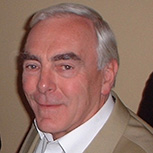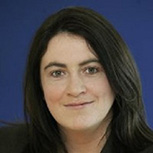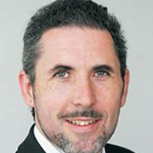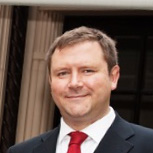Chief Executive
 Following a short illness and after 15 years of leadership of INEX, Barry Rhodes died in September 2018.
Following a short illness and after 15 years of leadership of INEX, Barry Rhodes died in September 2018.
Born in North London, Barry Rhodes qualified as a chartered accountant in 1965, but realised during a working vacation in the USA that accountancy was not for him. When he returned to London it was as an accounting machine salesperson with Burroughs Machines. He enjoyed a successful career with Burroughs in England and Kenya, before the company appointed him as its general manager for Ireland in 1977.
Four years later, wanting to make Dublin his permanent home, Barry resigned from Burroughs and became managing director of computer reseller Business Automation – part of the Matrix Group led by Joe Rooney. His internet experience began in 1996 when Samir Naji asked him to join Internet Services Ireland as marketing manager. This service provider then acquired business internet specialist EUnet Ireland and was, in turn, taken over by Esat Telecom Group in 1997 and by BT in 2000.
By 2003 Barry was semi-retired and performing consultancy roles within the BT organisation. Then Justin Verrecchia, BT’s representative on the INEX committee, informed him that the exchange was seeking a general manager. Barry applied for the post and became the first employee at INEX in September 2003 – initially working two days a week. In 2005 this was upped to three days and his title changed to CEO.
When Barry joined, all the INEX switching operations were concentrated in a single data centre. The association had just nine members and annual revenues of €91,000. After thirteen years under his leadership the exchange runs six points of presence in Dublin and another in Cork. It has 108 member organisations and has reduced the port connection charges in each of the past eight years, so that they are now approximately only a quarter of what they were in 2008.
David Mee
Chairperson 1996 – 1998
 David Mee was the first chairperson of the Internet Neutral Exchange Association. He took on this role when the company was incorporated in September
David Mee was the first chairperson of the Internet Neutral Exchange Association. He took on this role when the company was incorporated in September
1996 and held it until October 1998.
After qualifying as an engineer at University College Dublin, David spent six years working on robotics and automation in Germany and Japan, returning to Ireland in 1991. He entered the internet business four years later when Samir Naji and Paul Kenny asked him to take charge of a new access provider, Internet Services Ireland (ISI). The Horizon Computer Group, which Samir Naji had founded, was its majority shareholder.
ISI acquired EUnet Ireland in 1996 and took over the name of the older internet service provider. David became managing director of the merged organisation, which concentrated on delivering internet services to business customers – and particularly to Ireland’s larger companies.
EUnet Ireland played a central role in the planning and establishment of INEX as a neutral exchange. David led the board when it selected Cara to provide its first switching facility and when the first four members routed traffic through the new hub.
Esat Telecom Group bought EUnet Ireland in 1997 and changed its name to Esat Net. David left the company in the following year and returned to the Horizon Computer Group. Today, based in France, he is vice president of operations for Avnet Technology Solutions in Europe, Middle East and Africa.
Niall Murphy
Chairperson 2014 – 2016
 Niall Murphy has been working in the internet industry for over twenty years, beginning with founding the UCD Internet Society in 1995.
Niall Murphy has been working in the internet industry for over twenty years, beginning with founding the UCD Internet Society in 1995.
In the early days, Niall cut his teeth with building internet infrastructure in a series of ISPs and the .IE domain registry, and caught the earliest waves of the wireless revolution by designing, implementing and testing various parts of Digifone Online (later O2 & three.ie), Eircell’s ISP (later Vodafone), and being a founding member of Bitbuzz, the Wifi hotspot company now owned by Virgin Media.
He is the author of a number of books, talks, and papers, most recently Site Reliability Engineering (O’Reilly 2016), and a highly individual history of the Irish Internet (www.internethistory.ie). He holds degrees in computer science and mathematics, and poetry studies, which is surely some kind of mistake. At the time of writing he runs the ads reliability engineering group in Google’s Dublin Engineering office.
His chairmanship of INEX saw a number of key developments, including the opening of a regional exchange in Cork (using the CIX facilities in Hollyhill), hosting the ICANN meeting in the National Conference Centre, and the expansion of the exchange to its current eye-watering level of 88 full peering members: 108 in total!
For a country which was labelled a networking backwater in the 90s, and with no particular prospect of ever shedding that label, this might be considered a matter of national pride.
INEX’s release of the IXP manager software has also contributed to Ireland’s elevated visibility in its industry and, Niall believes, is a sterling example of what can be done with the community-minded spirit that it exemplifies.
Nick Hilliard
Chief Technology Officer
 In 1994 Nick joined IEunet, the first internet service provider in Ireland, when it was still a campus company at Trinity College Dublin. He has worked in the industry ever since as a specialist in IP backbone design and implementation and has been associated with INEX since its inception.
In 1994 Nick joined IEunet, the first internet service provider in Ireland, when it was still a campus company at Trinity College Dublin. He has worked in the industry ever since as a specialist in IP backbone design and implementation and has been associated with INEX since its inception.
His formal responsibility for operating the exchange began in 2001, the year when INEX moved its switching equipment to a new base at Data Electronics. Partnering with Niall Murphy, he took on technical support, monitoring and maintenance of the exchange. Nick subsequently became the chief technology officer of INEX and the key contact for members on technical matters.
In 2005 he developed the first version of IXP Manager as an application for internal use by the exchange. Since then the software has evolved into a much more powerful system which many IXPs around the world have deployed. Mostly rewritten by Barry O’Donovan, IXP Manager is still underpinned by the core database schema that Nick created at the beginning.
Nick and his colleague Barry O’Donovan established Island Bridge Networks in 2014. Today they offer network design and engineering services to internet exchanges, service providers, standards bodies and policy groups in Europe and further afield.
Mike Norris
Chairperson 1998 – 2005
Mike Norris became the first employee of HEAnet when he was appointed as its network co-ordinator in 1992. By the time that INEX was established four years later the academic and research network had evolved into Ireland’s largest internet service provider.
HEAnet has held a seat on the board of the INEX Association throughout its existence. Mike was its representative for the first fifteen years. INEX chose him as its second chairperson in 1998.
His engagement with educational networking has spanned all academic levels and successive generations of information technology. He pioneered schools computing and courseware in the classroom as an activist in the Computer Education Society of Ireland. He subsequently joined the UCD Computer Centre, where his responsibilities included the inter-university computer connections that preceded the internet. When IP networking took off, he was involved in the administration of the IE top level domain.
He guided the development of HEAnet as the organisation’s chief technical officer and as its head of research and innovation. At international level he served on the board of the RIPE Network Coordination Centre.
While Mike was in the chair at INEX the organisation expanded from a small band of internet service providers to a bigger and much broader community of networking strategists and practitioners. He steered the association through the drafting of its business plan in 2002 and through the subsequent appointment of a general manager and other staff. His academic background ensured that he was able to provide insightful counterpoints to the primarily commercial views of the various committee members.
Mike retired from HEAnet in 2012 and continued his studies in a variety of lifetime interests.
Eileen Gallagher
Marketing and Membership Development Manager
 A very proud Mayo woman, Eileen emigrated to London in 1991 where she worked in public relations.
A very proud Mayo woman, Eileen emigrated to London in 1991 where she worked in public relations.
She specialised in design and home interests for four years. In September 1996 she joined a technology PR agency. Her first client at Harvard Public Relations was Keith Mitchell from the London Internet Exchange. At Harvard she also had other networking and technology clients, including Motorola when it launched the then sparklingly fast 56k modem in early 1997.
In 2002 she moved to another tech agency in London, Brands2Life, as an associate director. In early 2003, after 12 years in London, Eileen returned home. At INEX, Eileen oversees marketing and membership development. When she arrived, there were just 18 members, few of which were content providers or regional ISPs. Active engagement, sometimes over many years, has helped to expand the membership significantly.
When she joined, INEX held infrequent ‘technical housekeeping’ meetings. Eileen initiated extended meetings with guest speakers as well as social networking opportunities for INEX members and the wider internet community.
She developed the INEX associate member category, created not only to grow the association but also to provide additional funding to support marketing and events.
Attracting and supporting international internet events in Ireland has been a key element of her work to enhance Ireland’s and INEX’s reputations. Thus far, INEX has supported Euro-IX, the European Peering Forum, RIPE 66 and ICANN meetings in Dublin.
Eileen was also instrumental in ensuring that INEX facilitated a visit to Ireland by the Emerald Atlantic team, when it was seeking a suitable landing point for a transatlantic subsea cable. The fact that, what is now the Aqua Comms AEConnect cable ultimately landed in her native Mayo is just a (happy) coincidence.
Fachtna Mylod (RIP)
Chairperson 2005 – 2011
 When NTL Communications became an INEX member it nominated Fachtna Mylod as its representative. He was elected to the INEX committee in 2003, the year that the association began its rapid expansion. In 2005 Mike Norris retired from the chair of INEX and the committee voted for Fachtna to take over the role. By then he had made a career change and was working in Verizon.
When NTL Communications became an INEX member it nominated Fachtna Mylod as its representative. He was elected to the INEX committee in 2003, the year that the association began its rapid expansion. In 2005 Mike Norris retired from the chair of INEX and the committee voted for Fachtna to take over the role. By then he had made a career change and was working in Verizon.
Fachtna held the position of INEX chairman with distinction for six years before standing down in 2011. When he took over the chair less than 20 members were peering at the exchange and the first content providers were just beginning to connect. At the end of his term the association had more than 60 members and INEX was experiencing traffic peaks above 20 Gbps.
Fachtna Mylod (1963-2015) was a gentle, jovial, family man who was liked and respected by all who came into contact with him. What many of us may not have realised is that he was also a person of great intellect, who could happily relax reading a book on quantum physics. This makes it all the more poignant that his untimely death was from a brain tumour, which consumed and destroyed him. He was only 52 when he passed on, leaving behind Joyce, his adored wife of 25 years, and his loving children Ciarán, Eimear and Deirbhile.
Amongst his many other achievements, Fachtna will be fondly remembered for the positive contribution that he made to the growth and development of INEX and he is sadly missed by us all.
Andrew Maybin
Chairperson 2011 – 2014
 A native of County Down, Andrew Maybin decided that he wanted to work in technology after spending his student years in a dusty law library. He replied to a mysterious two-line classified ad. It turned out to be for the old Telecom Eireann, which was expanding into Northern Ireland. Andrew was interviewed by two Dutch chaps who seemed to be excited by his knowledge of telecom calling cards. At Telecom Eireann NI he set up a new ISP and sold internet services to businesses.
A native of County Down, Andrew Maybin decided that he wanted to work in technology after spending his student years in a dusty law library. He replied to a mysterious two-line classified ad. It turned out to be for the old Telecom Eireann, which was expanding into Northern Ireland. Andrew was interviewed by two Dutch chaps who seemed to be excited by his knowledge of telecom calling cards. At Telecom Eireann NI he set up a new ISP and sold internet services to businesses.
In 2003 Andrew joined hosting and streaming provider Tibus as its network services director. He is now managing director of Tibus and Simply Zesty, one of Ireland’s leading web development agencies. Andrew also steers IT issues for Wireless Group plc and advises a number of blue-chip companies on internet strategy. Tibus joined INEX in 2006. Andrew had seen the benefits of an independent exchange for Eircom. When the Tibus hosting and connectivity businesses took off, he knew that INEX would help the company to deliver traffic well and give it a bit more gravitas in the market. He is an enthusiastic contributor to the wider IXP industry through LINX and LoNAP. He is deeply involved in the embryonic peering community in Belfast and is a supporter of the UK & Ireland Peering Forum.
Andrew became an INEX board member in 2008, believing that he could bring business experience, as opposed to technical network experience, onto the committee. He served as chairman from 2011 to 2014 – a time when transit prices were dropping through the floor and global CDNs were offering their services as an alternative to IXP membership. During his watch INEX weathered these external challenges while staying true to its mutual governance principles.
Barry O’Donovan
Network Consultant
 If you want to confuse Barry, ask him where he’s from: born in Cork, spent his formative years in Galway and married into Dublin. He got a honours degree in Maths, his first love, from NUI, Galway in 2001 and went on to do four years research in information theory in UCD’s Computer Science department.
If you want to confuse Barry, ask him where he’s from: born in Cork, spent his formative years in Galway and married into Dublin. He got a honours degree in Maths, his first love, from NUI, Galway in 2001 and went on to do four years research in information theory in UCD’s Computer Science department.
In 2005 he took a job with imag!ne to help build their ADSL broadband service from scratch to a position where it supported tens of thousands of subscribers. Barry branched out on his own in 2007 when he formed his own consultancy business, Open Source Solutions, which continued working with imag!ne as well as building up a portfolio of network, VoIP and web application development customers.
It was 2008 when Nick Hilliard, INEX’s CTO, approached Barry to provide a couple days operational support to INEX. Little did Barry realise what a huge part of his life INEX would become – both here in Ireland supporting INEX’s infrastructure and membership but also as part of the larger European and international IXP community.
Barry is the lead developer of IXP Manager (www.ixpmanager.org) – a full stack management system for IXPs which includes an administration and customer portal; provides end to end provisioning; and both teaches and implements best practice. INEX is very proud to say that this project is now in use at over 33 IXPs and has grown legs of its own with the wider community sponsoring a full-time developer.
INEX has always been happy to help other IXPs and, through our relationship with the Internet Society (ISOC), RIPE and Euro-IX, Barry has travelled to countries with a less developed internet infrastructure to advise on best practice, has delivered a number of IXP Manager workshops and contributes to policy development.
